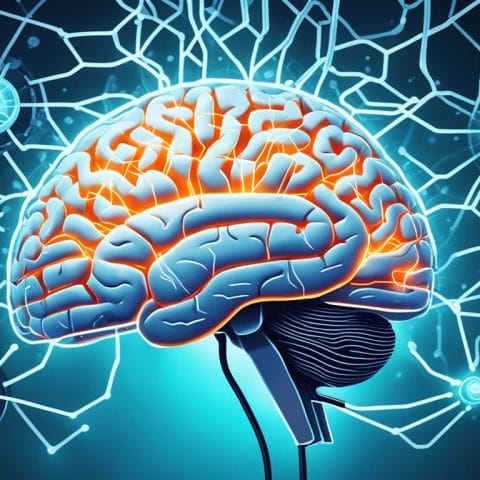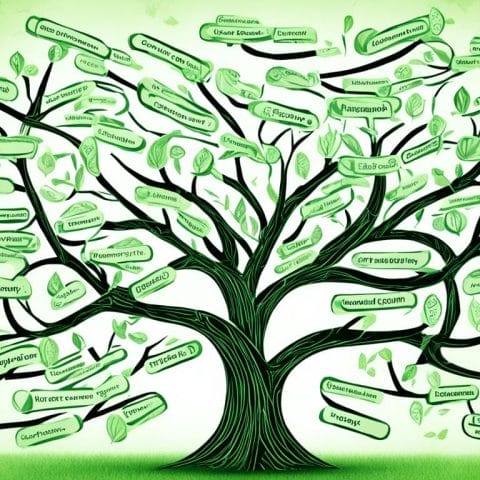Artificial intelligence (AI) is changing human resources (HR) in big ways. It’s making learning and development better. AI automates simple tasks and helps make better decisions. This lets HR people work on big plans that help the business grow.
AI is making training more personal and using cool tech like VR experiences. It’s changing how companies train and keep their workers happy.
AI tools like CloudApper hrGPT are making a big difference in HR. They’ve made workers 40% happier with their training. HR people also have 60% less work in managing training, so they can focus on important tasks.
Key Takeaways
- AI-driven platforms are revolutionizing HR training and development, leading to a more competent workforce.
- Personalized learning programs and immersive VR experiences are reshaping employee development.
- AI can automate repetitive HR tasks, enabling professionals to focus on strategic initiatives.
- Improved learning efficiency and reduced administrative burdens are among the benefits of AI in HR.
- Careful planning and communication are crucial when implementing AI solutions in HR.
The AI Awakening in HR Learning & Development

Across industries, organizations are embracing AI in HR. They see its power to streamline processes, improve employee experiences, and drive business outcomes. AI algorithms can analyze vast amounts of HR data, offering insights that humans might miss. This leads to more informed and effective HR strategies.
By using AI in HR, departments can save time and reduce bias. For instance, AI-powered recruitment tools can quickly scan resumes to find qualified candidates. AI can also analyze employee performance in real-time, providing feedback and suggestions for improvement.
Moreover, AI for HR can forecast employee turnover and future skill needs. This helps HR teams plan and address workforce challenges ahead of time. AI can also assess employee skills, identify areas for improvement, and create personalized learning paths.
| AI Capabilities in HR | Benefits |
|---|---|
| Data analysis and insights | Informed decision-making, reduced bias |
| Predictive workforce planning | Talent retention, skill development |
| Personalized learning paths | Improved employee engagement, productivity |
As AI in human resources evolves, organizations must manage the technology well. They need to address data privacy concerns and upskill their workforce. By embracing AI, HR departments can transform learning and development strategies. This enhances employee experiences and drives sustainable business growth.
AI-Powered Personalized Learning Paths

In today’s fast-changing business world, companies are using AI to change their training programs. They use AI to look at employee data and make learning fit each person’s needs. This makes learning more effective and efficient.
With ai for personalized learning, businesses can give their teams the best training. This leads to better results and smarter use of resources. The ai-powered learning paths help each employee learn at their own speed. They can learn important skills easily.
Tailoring Learning Experiences
The secret to good ai for skills gap analysis is knowing what each employee needs. AI tools gather data on how people interact with training. This helps suggest learning paths that fit their style and preferences.
- Gamification elements like points and leaderboards make learning fun by adding a challenge.
- Micro-learning, with short and flexible content, fits into busy schedules. It makes learning more efficient.
- Adaptive training changes the content and difficulty based on how well you’re doing. It makes sure you’re learning at the right level.
By using ai for personalized learning, companies can help their employees grow. This growth helps the business succeed in a changing market.
“AI-powered personalized learning paths are transforming corporate training, enabling organizations to provide customized learning experiences that drive better outcomes and more efficient use of resources.”
VR and AR for Immersive Training Experiences
Virtual reality (VR) and augmented reality (AR) are key in corporate learning. They offer new ways to improve training. Companies use VR training modules for employees to practice in a simulated world. This boosts their confidence and performance in real life.
These technologies make training more realistic and controlled. This is changing how we train in many industries. It ensures employees are ready to face challenges in their jobs.
Only 35% of businesses have succeeded in digital transformation, a recent interview found. But, AI and VR are changing learning and development. They offer immersive and engaging training experiences and make learning personal. Hybrid AI/VR learning saves time and resources by avoiding the need for physical spaces and meetings.
Adding AI into VR makes creating learning scenarios faster and easier. AI-driven characters in VR can adapt to learners, making training more dynamic. AI in VR also provides real-time data analytics, improving training effectiveness and personalization.
However, there are challenges in AI and VR integration. For example, AI needs accurate prompts and can sometimes provide incorrect data. There are also ethical concerns and areas where human interaction is better. Getting feedback from employees is key to improving these technologies.
The AI and VR combination is changing how we learn and develop. It offers immersive and engaging training experiences. Companies that use these technologies will prepare their employees for success.
Data-Driven Insights for Performance Evaluation
Using data and AI analytics is key for checking how well employees do in learning and development. With AI, companies can see how employees are doing in real-time. This helps spot where they need more training or improvement.
This way of using data helps make learning programs better. It makes sure they meet the company’s goals. Studies show that using technology and data well can make HR more effective. AI and data analytics can make HR even more strategic.
Monitoring and Optimizing Learning Programs
HR uses data to make better decisions and improve the company. By looking at HR data and how it fits with the company, they can find the best strategy. AI and generative AI make it easier for everyone to understand data insights.
AI has changed HR by making it easier to manage performance. It looks at lots of data to make detailed profiles of employees. This helps decide who to promote and how to help employees grow.
AI helps give feedback and coaching, which makes employees better faster. It also helps make sure reviews are fair. Plus, it helps keep track of who might leave the company by looking at past performance and how engaged they are.
| AI-Powered Performance Management Tools | Key Features |
|---|---|
| Omni | – Real-time performance tracking – Personalized development plans – Continuous feedback and coaching |
| SAP SuccessFactors | – Comprehensive employee profiles – Data-driven talent decisions – Predictive analytics for retention |
| UKG Pro | – AI-enabled performance reviews – Automated goal setting and tracking – Bias mitigation in evaluations |
Working with good HR automation providers is important. They offer AI solutions that fit the company’s needs. Training employees on these tools is key. Also, it’s important to keep checking how well they work and if they help with keeping talent.
ai in hr learning and development
Artificial intelligence (AI) is changing how companies train their employees. It helps create learning paths that fit each person’s needs. This way, training is more immersive and effective.
HR teams can now offer training that’s not just one-size-fits-all. They use AI to make learning more agile and data-driven. The AI education market is expected to grow a lot, showing AI’s big role in HR.
AI makes it easier to suggest learning content that’s right for each employee. This makes learning more engaging and personal. The demand for AI in learning has grown a lot, showing its value.
| Key Trends in AI for HR Learning and Development | Impact |
|---|---|
| Personalized learning paths | Tailored to individual employee needs and preferences |
| Immersive training experiences | Leveraging VR and AR for enhanced engagement and skill development |
| Data-driven insights | Optimizing learning programs and evaluating performance |
| Adaptive learning platforms | Providing personalized content and instant feedback |
| Chatbots for on-demand support | Facilitating just-in-time learning and assistance |
The future of learning and development in HR looks bright. AI will make learning more engaging and tailored. HR teams can empower their workforce to succeed in a changing world.
Chatbots for On-Demand Learning Support
In the world of corporate learning, ai chatbots for learning are changing the game. They offer employees help and guidance whenever they need it. These AI agents give personalized support, making sure learners get the info they need fast.
The market for ai chatbots is booming. It’s expected to jump from $5.4 billion in 2022 to $15.5 billion by 2028. A survey by Oracle shows 50% of HR leaders are already using or planning to use ai-powered learning assistants soon.
Chatbots for employee training use smart tech to talk to users in real-time. They’re always there, ready to help when learners hit a snag or need a nudge.
“By 2020, we’ll chat with chatbots more than we do with our spouses,” – Gartner
Using ai chatbots for learning in training brings many benefits. A Juniper Networks study says they could save companies up to $8 billion a year. Gartner also thinks chatbots will handle 20% of HR questions, making work easier and better for everyone.
As more companies use ai-powered learning assistants, we’re entering a new age of learning. It’s all about giving employees the tools they need to succeed in today’s fast-paced world.
Adaptive Learning Platforms
In today’s fast-changing world of work, adaptive learning platforms are making a big impact. These AI-powered tools offer personalized learning experiences. They adjust to each employee’s unique needs and likes.
By analyzing how users interact, these platforms make sure learners get the right info at the right time. This boosts engagement and helps them remember what they learn better.
Personalized Content and Instant Feedback
Corporate training is no longer one-size-fits-all. Adaptive learning platforms use AI to create personalized learning content. They match content to each learner’s style and pace.
As learners use the platform, it tracks their progress. It finds out what they’re good at and what they need to work on. Then, it changes the content to help them learn better.
These platforms also give instant feedback. They tell learners what they need to improve and what they’re doing well. This keeps learners motivated and helps them do better.
Studies show that adaptive learning platforms can make learning 33% faster and improve retention by 20%. They also use special learning techniques that boost retention by another 20%.
| Platform | Key Features | Customer Ratings |
|---|---|---|
| Adaptemy | Curriculum mapping, personalized learning experiences | – |
| SC Training | E-learning templates, analytics tools | 4.7/5 |
| Coursebox AI | Real-time feedback, task completion automation | – |
By using adaptive learning platforms, companies can make their training programs better. This leads to more engaged learners, better retention, and a more skilled team.
The Human Touch in AI-Driven Learning
As companies use AI in HR learning and development, keeping the human touch is key. AI offers great insights and makes things easier, but the human element is vital. It helps create a good work place and real connections with workers. Emotional intelligence (EQ) is more important than ever. HR folks need to handle tough situations, understand the context, and encourage creativity and new ideas.
Seeing AI as a partnership with human expertise and artificial intelligence is important. AI should help and support the human side, not replace it. By finding the right mix of AI and human touch, companies can make their learning and development programs work best.
- Empowering HR professionals with AI-driven insights to make more informed, personalized decisions.
- Fostering a culture of continuous learning and development that combines technology-enabled training with human-centric mentorship and coaching.
- Leveraging AI to create immersive and engaging learning experiences, while maintaining the personal touch through live interactions and feedback sessions.
- Ensuring that AI systems are designed and implemented with a focus on enhancing the human experience, rather than replacing it.
“The key is to find the right balance between AI and the human touch, where technology amplifies and supports the human element rather than replacing it.”
By combining AI and the human element, companies can build a learning and development system that works well. It’s efficient and empowering, leading to better engagement, productivity, and success in the long run.
The Future of AI in HR Learning & Development
Artificial Intelligence (AI) is changing HR learning and development. It will make corporate training better. AI will help create personalized, data-driven, and immersive learning experiences.
Natural Language Processing (NLP) is becoming more common. It helps with better communication in learning platforms. AI chatbots and virtual assistants offer 24/7 support, answering questions and guiding learners.
Virtual Reality (VR) and Augmented Reality (AR) are also being used. They make training more real and interactive. Learners can practice skills in a safe, engaging way.
Adaptive learning platforms powered by AI are also emerging. They offer personalized content and instant feedback. These systems adjust to each learner’s needs, improving knowledge retention and skill development.
AI is key for organizations to stay ahead in the future. It helps create engaging, data-driven, and adaptive learning experiences. This empowers employees to succeed in a changing work world.
| AI Trends in HR Learning & Development | Potential Benefits |
|---|---|
| Natural Language Processing (NLP) for enhanced communication and interaction | Personalized, on-demand learning support; improved engagement and skill acquisition |
| Integration of Virtual Reality (VR) and Augmented Reality (AR) for immersive training | More impactful and memorable learning experiences; better skill development |
| Adaptive learning platforms powered by AI | Personalized content and instant feedback; improved knowledge retention and organizational performance |
As the future of work evolves, AI in HR learning and development is key. It helps companies create engaging, data-driven, and adaptive learning experiences. This empowers employees to thrive in a changing work world.
“AI could potentially contribute $15.7 trillion to the global economy by 2030, with a notable portion attributed to enhanced productivity through AI-powered learning and development initiatives.”
Conclusion
AI has changed how companies train their employees. It helps create personalized learning plans and immersive training. This way, companies can see how well their training works.
AI will keep growing in HR, helping companies stay ahead. They can make their training more flexible and based on data. This balance between AI and human touch is key to success.
The benefits of AI in HR are clear. It makes training better and gives insights to improve programs. By using AI, companies can prepare their workforce for the future.
FAQ
What is the role of AI in HR learning and development?
AI is changing HR learning and development. It automates tasks, improves decision-making, and lets HR focus on strategy. AI makes training more personalized, using VR and data to improve employee skills.
How are AI-powered personalized learning paths transforming corporate training?
AI creates learning paths tailored to each employee. It uses data to offer the right training. This leads to better training and more efficient use of resources.
What is the role of VR and AR in corporate learning and development?
VR and AR are key in corporate training. They offer new ways to train employees. VR lets employees practice in simulated environments, boosting their skills.
How are data-driven insights used in the evaluation of employee performance?
AI analytics help track employee progress in real-time. It spots skill gaps and training needs. This data helps improve learning programs based on facts, not guesses.
What is the role of chatbots in corporate learning?
Chatbots help employees get support and guidance anytime. They use AI to offer personalized help and simulate conversations. This makes learning more interactive.
How do adaptive learning platforms leverage AI to provide personalized learning experiences?
Adaptive learning platforms use AI to adjust training based on how well employees do. They make sure training is both challenging and engaging. This meets each employee’s learning needs.
How can organizations maintain the human touch while integrating AI in HR learning and development?
AI is great for insights and efficiency, but humans are key for a positive work environment. It’s important to balance AI with human touch. AI should support, not replace, human expertise.
What are the emerging trends in AI-driven HR learning and development?
Trends like NLP, VR, and adaptive learning will change corporate learning. These AI tools make learning more engaging, personalized, and data-driven. They help organizations improve employee skills.





